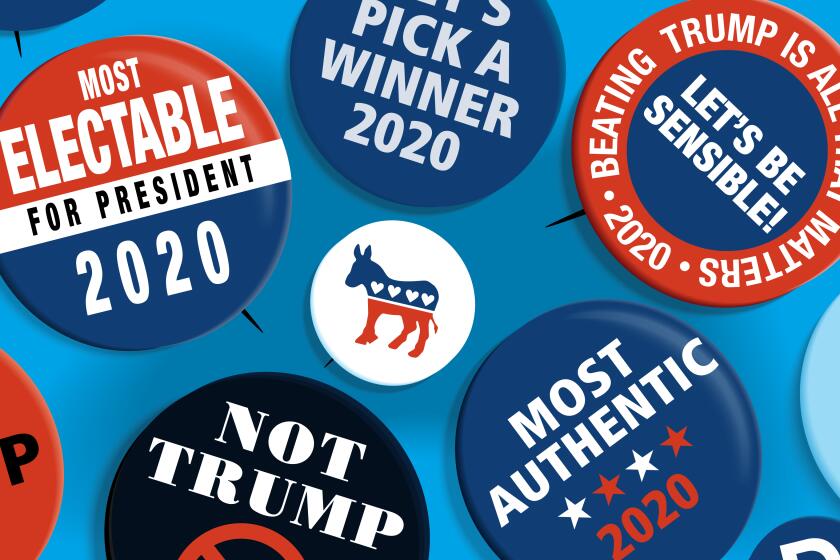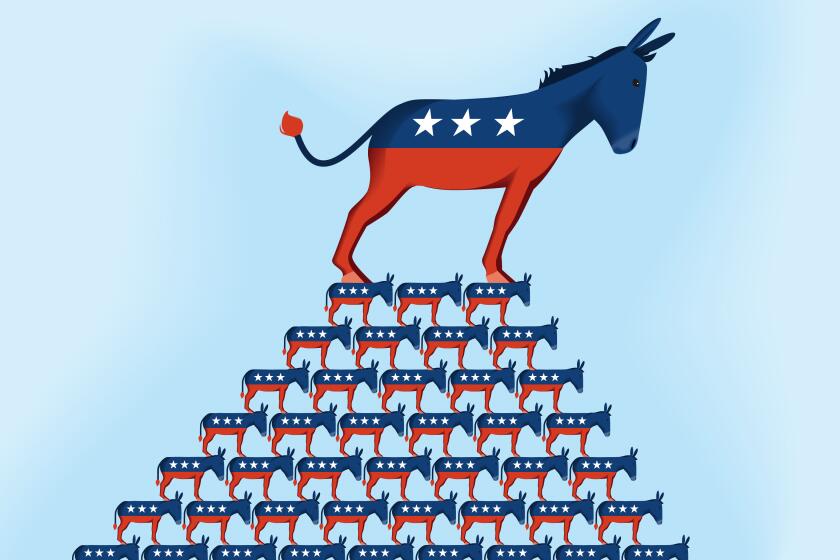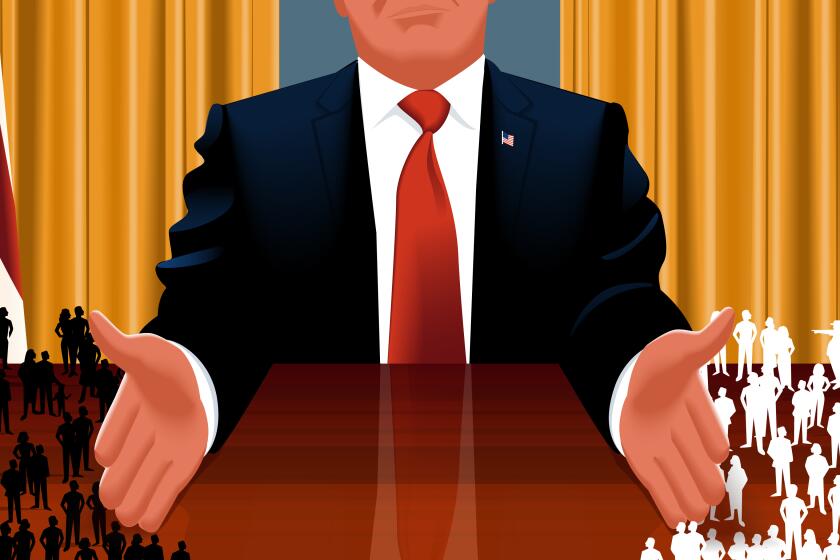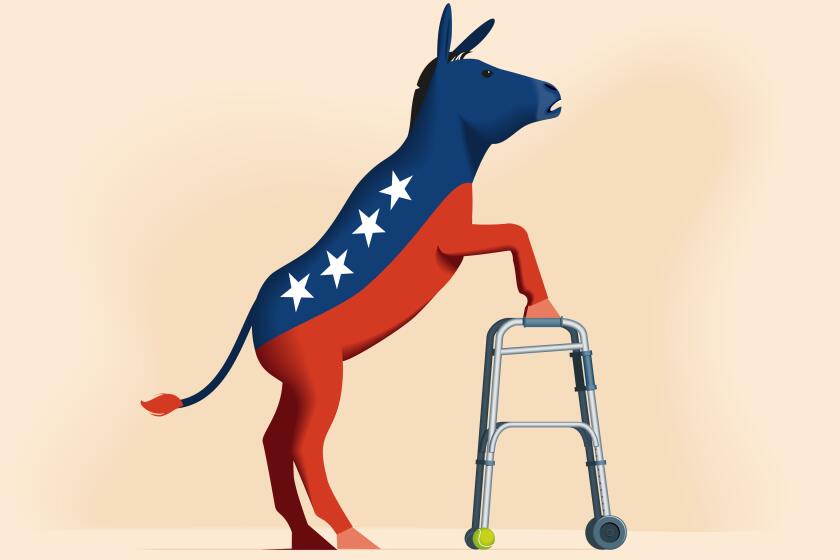Cleaning up Trump’s mess

- Share via
The next presidential election will be about character and fitness to lead the nation above all else. But the Democratic primary will also be a contest of ideas, which helps explain why the candidates have been cranking out plans, proposals and white papers like blue plate specials at a diner.
As the 2016 election showed, though, having binders full of detailed initiatives won’t necessarily help in a contest against Trump and his irrational, often unfulfillable promises. So some Democrats are following his lead, serving up sweeping proposals to combat climate change and spread prosperity that could best be characterized as “aspirational.”
It’s reasonable to demand solutions bold enough to meet the enormous challenges of the day. But voters beware! Do not be beguiled by patently unachievable initiatives designed to win primaries. Keep your eyes focused on November, on the issues that matter most to Americans of every political stripe.
At the moment, the 2020 candidate are split into progressive and moderate camps on most of the issues that rank high among voters’ concerns, including climate change, the economy and education. Sen. Bernie Sanders (I-Vt.) typically proposes the most ambitious, comprehensive and expensive initiatives, with the greatest amount of intervention by the federal government. Sen. Elizabeth Warren (D-Mass.) also calls for an aggressive federal role policing the private sector, although she differs with Sanders on some important details. The rest of the candidates offer less expensive but also less far-reaching ideas, while still calling for the federal government to do significantly more than it is doing today on those issues.
The price tag of the various plans is the easiest number to grasp, but that’s not the only factor voters should be paying attention to. At least as important is the plausibility of the proposal. Does the candidate have a fully fleshed-out plan? Are the central ideas backed up by research and experience? Is there support already from the major stakeholders? Does the candidate have a track record of getting his or her proposals through Congress? And if Congress won’t get on board, how does the candidate plan to make progress anyway?
That last question looms large, considering the polarized politics of the times and the ability of each party to frustrate the other’s priorities. Give Sanders credit for candor: he freely admits that his signature proposals won’t become law without a voter “revolution” that replaces many of the lawmakers now in office with his allies. But is such a revolution even possible? Other candidates have suggested eliminating the Senate filibuster rule to make legislating easier, although it is worth remembering that the rule has restrained extreme GOP ideas as effectively as Democratic ones.
And some have promised to make even more aggressive use than Trump has of executive orders; the best example of that is Sen. Kamala Harris (D-Calif.), who has promised to use executive orders to achieve results on such contentious issues as gun control, immigration and prescription drug costs. Even if you like the end result being sought, you need to consider the opening that might create for future presidents to impose their own, less appealing agendas.
Trump’s strongest claims will be on the economy, with its record low unemployment, rising wages and stock markets, and stable prices. It’s not all good, of course. Growth is slowing now in part because of the fusillade of costly tariffs Trump has exchanged with China and other U.S. trading partners, reviving the strong-arm protectionism that Trump’s predecessors sought to eliminate from global commerce. Meanwhile, U.S. manufacturers have fallen into a recession, median income has barely grown in two decades, and Trump has threatened to cut federal aid to California for having the temerity to challenge multiple administration policies. Nevertheless, Democrats may find it hard to persuade the masses that Trump’s policies have created a dystopian landscape of haves and have-nots.
The one pocketbook issue that Trump is clearly vulnerable on is healthcare, where rising costs are straining the budgets of voters in both parties. Yet it’s not a slam-dunk issue for Democrats.
Seemingly every 2020 candidate wants to make health insurance more affordable, but then, Trump says that’s exactly what he’s been doing. The difference is that the Trump administration and its GOP allies in Congress have been promoting cheaper, thinner insurance plans and enabling people to choose to go without insurance, while also taking countless swipes at the Affordable Care Act passed under President Obama — actions that have raised ACA premiums and undermined the ability of people with preexisting conditions to get the coverage they need.
Still, Democrats can’t simply defend the ACA as it currently exists; the premiums are straining some Americans’ budgets, while millions of others in this country are ineligible for coverage they can afford. And the 2020 candidates are not standing pat; instead, they’re advancing two competing routes toward universal insurance coverage. One would extend a version of Medicare to all Americans, eliminating out-of-pocket spending for healthcare but raising federal spending by trillions of dollars; the other would make Medicare or a similar public insurance plan available as an optional alternative to private insurance, leaving most people with the coverage they have now.
Of the most popular candidates, Sanders, Warren and businessman Andrew Yang are the ones dedicated to full-blown Medicare for all. Former Vice President Joe Biden, former Rep. Beto O’Rourke (D-Texas) and current Sen. Amy Klobuchar (D-Minn.) reject some key tenets of Medicare for all as too disruptive, and would instead offer a public option to compete with private insurance plans. The rest of the candidates still on the debate stage, including Sens. Harris and Cory Booker (D-N.J.), Mayor Pete Buttigieg of South Bend, Ind., and former Housing Secretary Julian Castro, favor a gradual path to Medicare for all.
While each route has its pros and cons, the key for voters is deciding whether the more ambitious plans are too costly and divisive to be achievable, or conversely whether the less ambitious plans offer too modest a contrast to Trump’s approach. We all need to hear more from the candidates before we can make that judgment.
Another issue to watch: How would the candidates repair the damage Trump has wreaked upon U.S. institutions, political norms and relations? It’s more than just bringing a polarized nation back together; it’s about rebuilding the public’s trust in government, restoring the rest of the world’s faith in the United States as an ally and a moral leader, and reversing direction on policies from climate change to immigration. Accomplishing these tasks is going to take time, leadership, resources and strong political skills.
Again, polls suggest that most voters trust any Democratic candidate to do a better job than Trump and other Republicans on the issues they care about. But that may change once their ideas are held up to the harsh, negative light of a general election campaign, which is why voters need to look at the 2020 candidates’ competing plans with an eye toward which ones will stand up best next November.
More to Read
A cure for the common opinion
Get thought-provoking perspectives with our weekly newsletter.
You may occasionally receive promotional content from the Los Angeles Times.

















